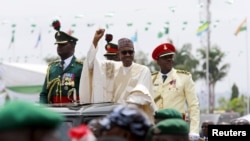Amid tough times and high hopes for change in Africa’s most populous nation, Nigeria’s new president Muhammadu Buhari took the oath of office on Friday in the capital Abuja.
Buhari – the first Nigerian to defeat a sitting president in popular elections – was sworn in Friday, surrounded by banners featuring the green and white of the Nigerian flag.
The ceremony was attended by dozens of heads of state. U.S. Secretary of State John Kerry headed a delegation from the United States.
Buhari takes office at a time of uncertainty in Nigeria. He defeated former president Goodluck Jonathan in presidential polls last month. Jonathan was the first incumbent president to fail to win re-election since Nigeria returned to democracy in 1999.
The country became Africa’s largest economy last year, but the low price of its top commodity, crude oil, is slowing down business.
A dispute between the government and marketers caused a nationwide fuel shortage in the days leading up to the inauguration. And the Islamist militant group Boko Haram remains a threat to the country’s northeast despite recent military advances.
In his inauguration speech in Abuja’s Eagle Square, Buhari vowed action.
“Insecurity, pervasive corruption, the hitherto unending and seemingly impossible fuel and power shortages, are the immediate concerns," he said. "We are going to tackle them head-on.”
In addressing the Boko Haram crisis, Buhari announced the temporary relocation of the country’s military command to the northeast city of Maiduguri.
Boko Haram got its start there, and has repeatedly attacked the city in its six-year campaign to impose strict Islamic law on the northeast.
Buhari also addressed the issue of militancy in the Niger Delta, which is home to most of Nigeria’s petroleum production but also to local militant groups.
Those groups were sabotaging oil pipelines and kidnapping oil workers until a 2009 government amnesty program gave them cash in exchange for peace.
Buhari says those cash payments would stop later this year.
“But the government intends to invest heavily in the projects and program currently in place," he said. "I call on the leadership and people in these areas to cooperate with the state and federal government in the rehabilitation programs which will be streamlined and made more effective.”
Ending the amnesty in a risky proposition for Buhari. He’s unpopular in the Niger Delta, and before this election, some militants threatened to restart their attacks if the amnesty ended.
Amid celebrations in the northern city of Kaduna, many voters there say they have no regrets about voting for Buhari, a former military ruler turned democrat.
Buhari was briefly a military dictator in the 1980s. The 72-year-old says that as a “born-again democrat” he can heal the woes of Nigeria.
Political reaction
The leader of the local Igbo ethnic community, Chief Dominic Uzo, says he’s keeping an open mind about the new leader.
“Let us see whether our story will be different from what we have been having for the past 16 years," Uzo said. "It is not out of place for a country to have a change.”
But some nervous politicians fear Buhari's promise to retrieve ill-gotten gains for coffers emptied by massive corruption.
Nigerian newspapers carried unconfirmed reports that some politicians already have returned millions of dollars in hopes of avoiding scrutiny.
“We see him as our only hope against this crippling corruption,” said Efo Okorare, curator of an open-air exhibition of Nigerian leaders, pointing out the many in military uniforms.
Jonathan attended, smiling and wearing his signature broad-brimmed hat as he stood next to his successor following the swearing-in.
As the inauguration drew to a close, Mr. Jonathan left in a black SUV, heading for his hometown of Otuoke in the southern state of Bayelsa.
VOA correspondents Ubale Musa contributed reporting from Abuja and Ibrahima Yakubu contributed reporting from Kaduna, Nigeria




